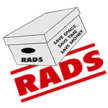Get business smart with Document Storage
Forget those filing cabinets & make way for smarter document storage.

Getting back in the swing of things and realising you have zero storage for all that paperwork that accumulated over the past 12 months? Well it’s time to ditch the filing cabinet and consider external document storage, where business and personal data is archived and stored correctly – and securely of course.

Invest in tools to digitize incoming paperwork as far as possible
You may not even need to invest in tools. These days, probably the single, biggest source of incoming paper is the expenses process and the average mobile phone camera can capture tickets and till receipts perfectly clearly.
If you have the budget, you can invest in scanning software to do the bulk of the data-entry work, although you will still need to have human staff double-check it.
Implement a document retention policy of only holding on to paper for as long as you are sure you need it. In the case of paperwork for expenses, you should really only need to hold onto originals for a month or so to give finance teams time to make sure everything is OK.
These days, there is likely to be very little in the way of incoming finance-related paperwork. If you’re still getting paper invoices and so forth, have a word with whoever’s sending them. They’ll probably be quite happy to switch to electronic ones, but if not, then make sure that they are simply scanned and moved on as appropriate.
If you are doing anything which generates paperwork, for example sending out paper forms instead of digital ones, then do your best to stop it if you possibly can.
Commit to scanning your existing paperwork
When you’re looking at mounds and mounds of old paperwork, scanning it can seem like a painful task, but like most painful tasks, the longer you leave it the worse it will be.
Looking at the situation from a more positive perspective, once it is done, you’ll feel the better for it. In fact, you will be the better for it because you’ll have cleared up space and resolved the security (and safety) issues relating to the storage of mounds of paperwork.
The most pragmatic way to go about this process is generally just to duplicate whatever organization you already have in place (if any). For example, if you have everything stored in piles of boxes, give each box a number and save the corresponding scans in a folder with that number.
Then you can go through the scans, work out what paperwork needs to be kept (probably very little) and what can be (shredded and then) recycled.

Move document archives offsite
If you need to keep physical paperwork for compliance reasons, then move it offsite. Not only does that clear up space in your office, but it also makes sure that the paperwork is stored in the safest of conditions. Now you don’t have to experience the frustration of devoting a lot of space to paper storage only to discover that the documents you need have degraded to the point that they are no longer acceptable.
It’s still recommended to scan any documents you do intend to keep. First of all, this will minimize the likelihood of you needing to retrieve the actual paperwork from your offsite storage facility. If you just want to check the document; you can look at the scanned copy.
Secondly, it will give you a back-up if anything does happen to the original. It may not be what HMRC wants, but it may be enough to convince them to cut you a bit of slack, especially if you can show that you did everything reasonably possible to protect the original.
About the Creator
Gavin Prior
Gavin Prior is the General Manager at Rads Document Storage, a secure facility based in Nottingham which provides professional document management services.






Comments
There are no comments for this story
Be the first to respond and start the conversation.